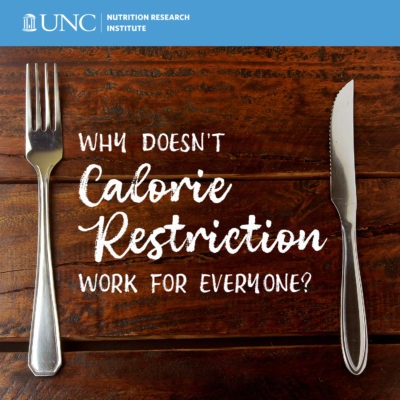A new study from the UNC Nutrition Research Institute (NRI), published in the American Journal of Physiology, reveals metabolic markers that may predict weight loss success on calorie restriction (CR). Led by Evan Paules, PhD, a postdoctoral fellow in the Hursting Lab, this research includes contributions from three principal investigators at the NRI. In this preclinical study conducted in mice, scientists identified metabolic factors that may predict weight loss success – findings that could eventually help tailor more effective strategies for people struggling with obesity.
The study focused on identifying predictors of resistance to calorie restriction calorie restricted-induced weight loss. Researchers observed significant variability in weight loss outcomes among subjects, even when following the same calorie restriction protocol. This variability suggests that individual genetic and metabolic profiles – the unique patterns of how each body processes and uses energy, including factors like fat metabolism, blood sugar regulation, and hormone levels – play a crucial role in determining how effective calorie restriction will be for a given person.
💡 What are metabolic profiles?
A metabolic profile is like a snapshot of how your body processes energy. It helps explain why people respond differently to the same diet or lifestyle changes.
- Energy Use: Includes how efficiently your body burns calories, stores fat, and uses fuel during rest or activity.
- Biomarkers: Involves levels of substances in your blood, like glucose, insulin, cholesterol, and certain metabolites that reflect metabolic health.
- Individual Variation: Shaped by genetics, diet, physical activity, and other lifestyle factors—making each person’s metabolism unique.
“Our goal was to identify markers that could be used to best match individuals to calorie restriction plans for weight loss,” said Paules. “By identifying specific metabolic markers linked to weight loss responsiveness, we hope to pave the way for more personalized and effective approaches to supporting healthy weight.”
One of the key findings was the identification of sex-specific metabolic predictors. In males, lower blood glucose levels were linked to resistance to weight loss under calorie restriction. In females, reduced weight loss was associated with lower levels of hormones and proteins involved in key metabolic functions: a blood sugar-regulating hormone (insulin), a molecule associated with obesity and inflammation (resistin), and a protein that plays a role in blood clotting (plasminogen activator inhibitor-1). At the same time, higher levels of ghrelin, a hormone that stimulates appetite, were also observed. These results highlight the importance of considering sex-based differences in metabolism when designing weight loss strategies.
Additionally, the study found that lower levels of leptin—a hormone produced by fat cells that helps regulate energy balance by inhibiting hunger—were predictive of resistance to weight loss, regardless of sex. This suggests that leptin levels may serve as a universal marker to help identify who would and would not respond well to calorie restriction.
These insights have significant implications for personalized nutrition and weight management. By assessing an individual’s metabolic profile, healthcare providers could better predict their response to calorie restriction and tailor interventions accordingly. For instance, individuals identified as resistant to calorie restricted-induced weight loss might benefit from alternative strategies, such as incorporating specific types of physical activity, pharmacological interventions, or dietary adjustments that target their unique metabolic characteristics.
While this study was conducted on animal models, the findings provide a foundational understanding that could inform future research in humans. Further studies are needed to validate these metabolic markers in human populations and to explore how they can be integrated into clinical practice. Nonetheless, this research represents a promising step toward more individualized and effective approaches to weight loss and obesity management.
This study highlights the complexity of weight loss and the limitations of one-size-fits-all approaches. By identifying specific metabolic predictors of responsiveness to calorie restriction, researchers are moving closer to developing personalized interventions that consider individual differences in metabolism and hormonal responses. Such advancements hold the potential to improve the effectiveness of weight loss strategies and contribute to better health outcomes for individuals struggling with obesity.
Paules, EM, VerHague, M, Lulla, AA, Meyer, KA, Coleman, MF, Albright, J, Bennett, BJ, North, KE, Howard, AG, Gordon-Larsen, P, Trujillo-Gonzalez, I, French, JE and Hursting, SD. “Sex-specific systemic metabolic predictors of resistance to calorie restriction-induced weight loss in obese Diversity Outbred mice.” Am J Physiol Regul Integr Comp Physiol. 2025 Apr 18; DOI:10.1152/ajpregu.00220.2024.
About the Researcher:
Evan Paules, PhD, joined the NRI in August 2016 as a doctoral student under the mentorship of Steven Zeisel, MD, PhD. After receiving his doctoral degree, Paules joined the lab of Stephen Hursting, PhD, MPH, where he is now a postdoctoral research Fellow studying obesity and energy balance.

